Tales of Arise Review: Bigger (but Not Better) than Ever
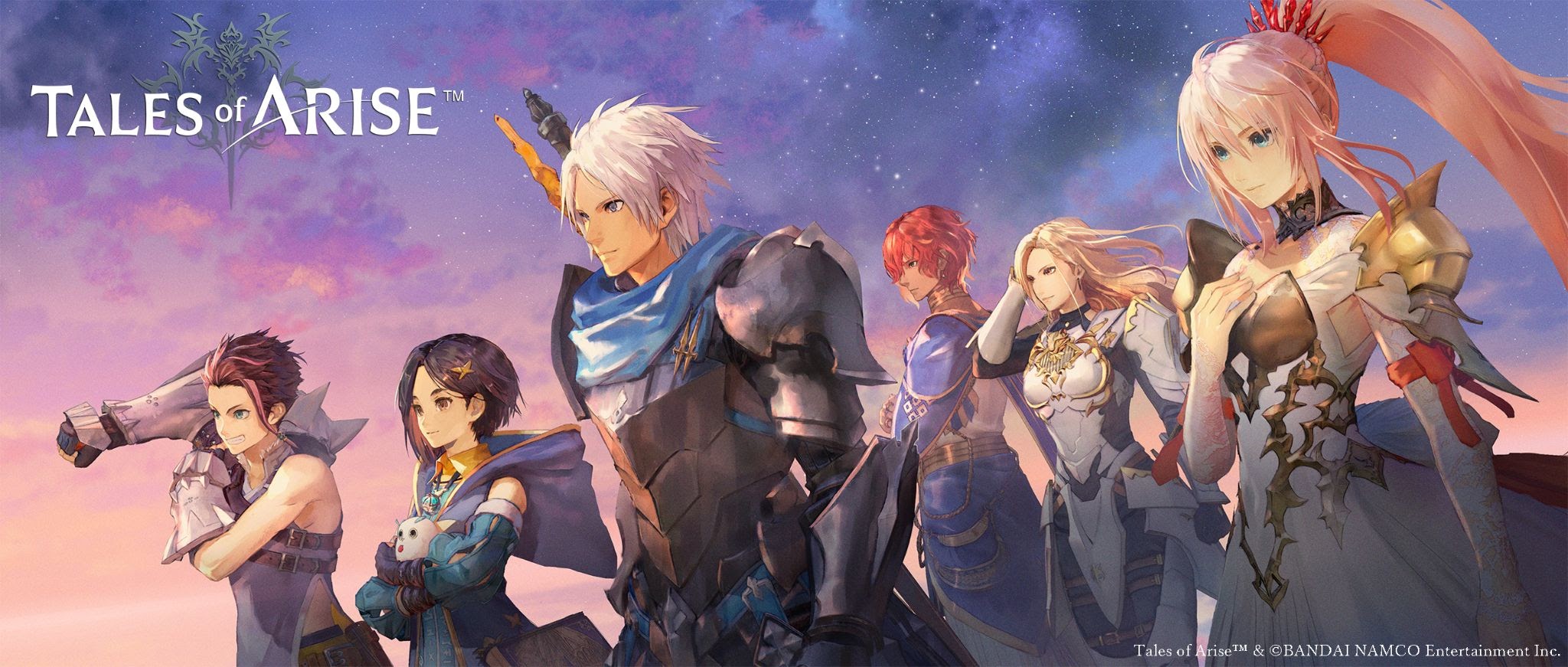 Tales of Arise is one of the few big JRPGs of 2021. It's a noticeable upgrade for the series, but the transition to "Big Budget Triple-A Game" was not exactly a clean one.
Tales of Arise is one of the few big JRPGs of 2021. It's a noticeable upgrade for the series, but the transition to "Big Budget Triple-A Game" was not exactly a clean one.Disclaimers
- I will keep plot-specific spoilers to a minimum, but beware: this post will contain spoilers.
- I completed the entire game on the "Hard" difficulty. I also completed most of the post-game content. Beating the main game (with lots of sidequests) took me about 60 hours, while the post-game content took me about 10-15 hours.
- I played the game on the Xbox Series X. I also got to witness first-hand how the game runs on PS4 (my wife was playing it alongside me).
Introduction: Setting the Stage
Tales Of Arise is the latest entry in the long-running Tales series. Developed and published by Bandai Namco, Arise was pitched early on as a much-needed evolution for the series. The last two entries, Tales of Zestiria (2015) and Tales Of Berseria (2017), both received criticism at the time for looking and feeling distinctly last-gen. Both games were simultaneously released for the PS3 and PS4, and next to games like Uncharted 4 (2016), the Tales series was starting to look and feel stale.
In response to that criticism, the development team migrated the series to Unreal Engine 4 and promised to give the Tales series a much needed facelift, in addition to higher production values, a more-open world, and an evolution of the game's core mechanics.
How well did Bandai Namco stick to their promises? Having spent 80+ hours in the world of Arise, I think I'm in a good spot to answer that question. But in order to properly summarize those 80 hours, this review may get a little long: I want to praise Bandai Namco for taking a giant leap forward, as well as criticize them for taking several steps back.
Without further ado, let's get this anime JRPG party started!
The Good Stuff
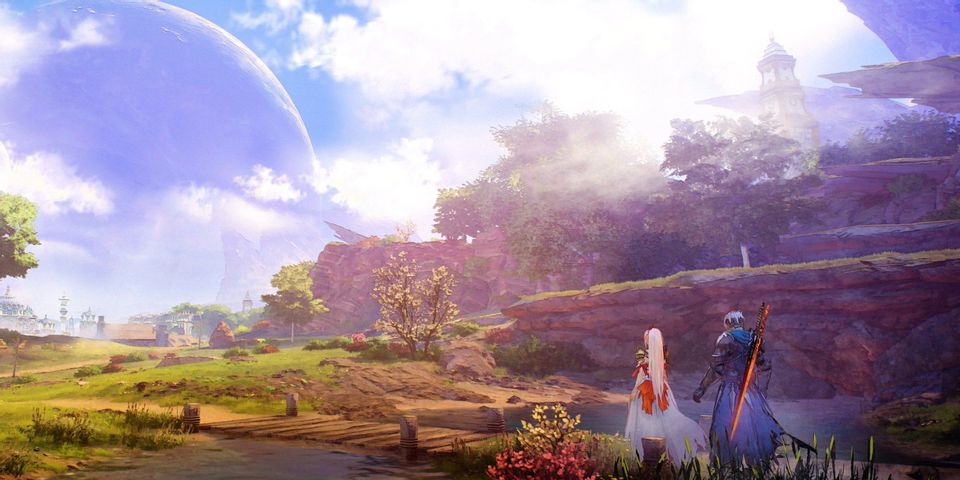 Arise makes a great first impression. Image Credit: Game Rant
Arise makes a great first impression. Image Credit: Game Rant
Credit where credit is due: Arise makes a fantastic first impression. The game's visual presentation, and especially the use of its "Atmospheric Shader", is excellent. I was initially concerned that the game's use of Unreal Engine 4 would make the game lose its signature watercolor aesthetic, but I think Arise's developers found a great middle ground between hyper-realistic and childish. The environments and particle effects have a realistic, yet fantastical, quality to them, and character models look pleasingly anime-esque without looking too cartoony.
Character animations are also an amazing sight to behold: characters swing, punch, cast, and slam with a surprising amount of heft. Special moves are flashy and entertaining, even after the 100th time you've seen them. Flame and lightening effect punctuate duo-attacks (called "Boost Strikes"), and despite being a little dizzying at times, the game's battles are a fantastic spectacle.
Thankfully, despite being flashy and occasionally overwhelming, the game maintains a rock-steady 60 frames-per-second during battles (assuming you're on PS5 or Series X). Major props to the development team for this achievement in an era where most games struggle to maintain 30 FPS.
Narrative-wise, the game's first several hours are also impressive. Rather than spending its first couple hours in a boring, idyllic town like most JRPGs (and even past games in the series), Arise gets straight to the point. It begins with a harrowing scene of slaves being tortured and mistreated, followed by a high-octane chase involving one of the game's main female protagonists, Shionne. With liberal use of gorgeous anime cutscenes and a booming orchestral score, the game's opening act forces players to recognize that Arise is not like other Tales games. It seems to say, "I'm bigger and better, so you'd better buckle up".
The game's visual and narrative upgrades are accompanied by a stellar voice cast. English localizations are often a secondary concern for JRPGs and tend to suffer from poor voice direction: chirpy and over-enthusiastic at best, and cringe-inducing at worst. Thankfully, Arise avoids this trend with mature, professional-sounding voice acting. That's not to say that it doesn't have its fair share of anime-induced silliness, but I did appreciate the game's shift to a slightly more serious tone.
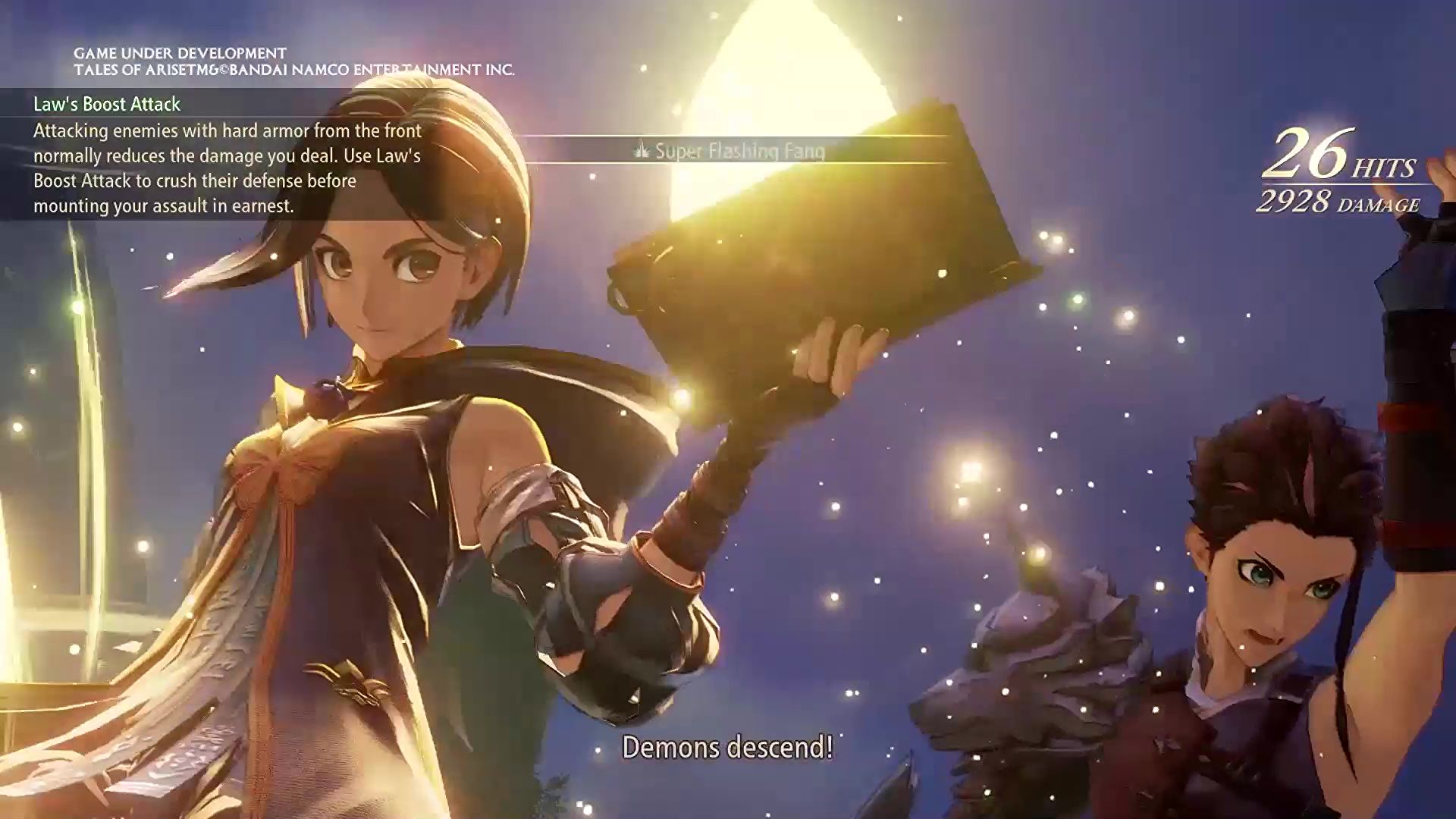 The game's frantic and frenzied real-time battle system is great fun, albeit in moderately-sized doses. Image Credit: Rock Paper Shotgun
The game's frantic and frenzied real-time battle system is great fun, albeit in moderately-sized doses. Image Credit: Rock Paper Shotgun
The most important element of the Tales series, however, is its real-time battle system, and I'm happy to report that it does not disappoint. It's fast and (in moderate amounts) very enjoyable.
In a nod to long-time fans of the series, the battle system returns to its roots of having two distinct types of attacks: normal attacks and special attacks called "Artes" (the latter consumes resources so they cannot be spammed). There is also an entirely different set of attacks that can only be performed in the air. Learning how to chain together normal attacks and Artes, both grounded and in the air, to extend combos is challenging and rewarding.
To keep things fresh, extra skills and Artes are unlocked along the way, which encourages players to experiment with mixing and matching Artes (since you can only equip several at a time) to maximize damage output. In addition, if you get bored of using Alphen, the game's vanilla swordsman, there are 5 other characters you can choose from, which all play very differently from one another. I found myself switching from Alphen to Law (fists) to Rinwell (mage) to Shionne (guns) on a regular basis.
All in all, Arise seriously impresses right out of the gate, and smartly doles out small changes as the game progresses to keep things interesting.
The Bad Stuff
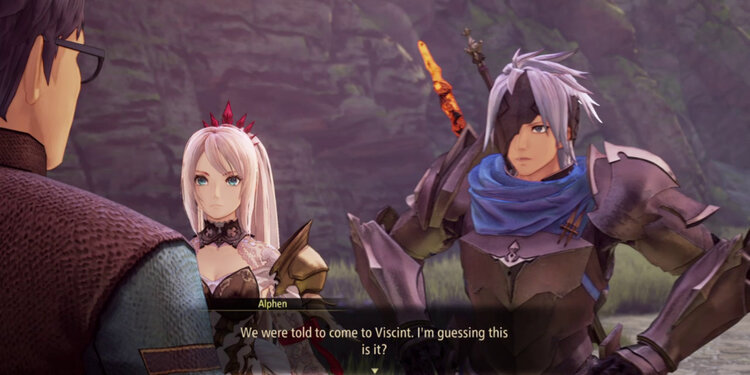 You'll spend a lot of time mostly listening to (but sometimes) reading dialog, which ranges from entertaining to mind-numbing.
You'll spend a lot of time mostly listening to (but sometimes) reading dialog, which ranges from entertaining to mind-numbing.
Despite the game's strong opening, problems begin to emerge as the game progresses. Character dialog begins to bore. Side quests become rote and uninteresting. The story's progression becomes predictable as you enter the 2nd or 3rd zone. In general, after about 10 to 20 hours, the game's Triple-A facade starts to wear away.
That's not to say that the game absolutely falls apart after 10 or 20 hours (that actually happens a little later, which I'll get to in the next section), but cracks begin to show. To keep things brief, below is a list of issues that I uncovered as I went deeper into the game:
- No local co-op play. Almost every Tales game to date had featured the ability for 1, 2, or 3 other players to join the main player in battles, which makes the experience much more fun. Disappointingly, Arise drops this feature.
- The music in this game is bland and forgettable. I see the direction they were going for: mature, brooding, and epic. But the soundtrack suffers because of how few tracks there are. And despite despite the small number of tracks, they all sound pretty much the same.
- Breath of the Wild, this ain't. There are far too many invisible walls, and the vast, open-ended vistas that were showcased in Arise's early trailers are actually cramped and restrictive.
- There's very little enemy variety. There's about 6-8 enemy types (excluding bosses) in the entire game, and they're simply reskinned, re-colored, and given buffed up health/strength as you progress.
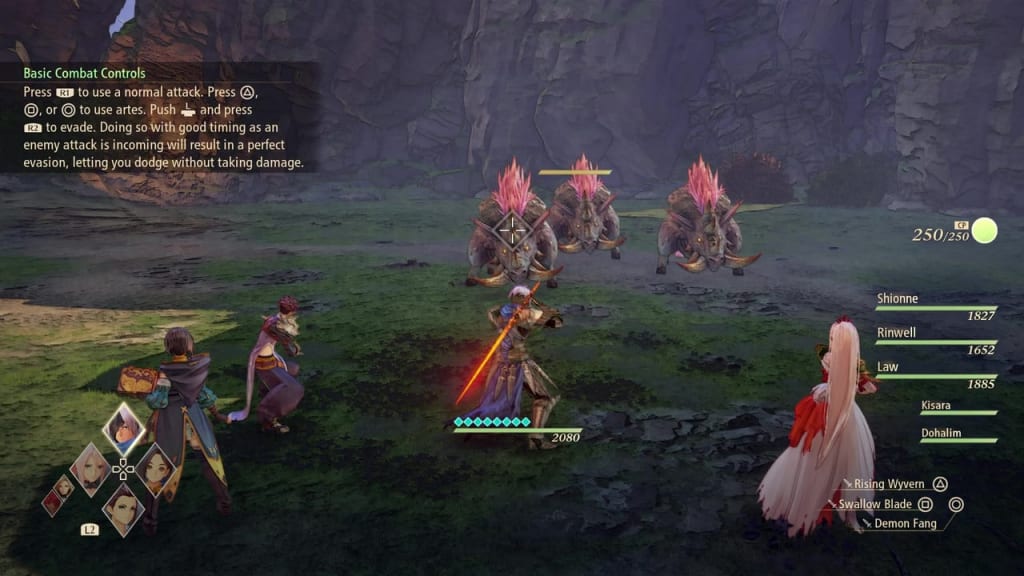 Get used to these boar enemies. You'll be fighting them for about 60 more hours. Image Credit: Samurai Gamers
Get used to these boar enemies. You'll be fighting them for about 60 more hours. Image Credit: Samurai Gamers
- The 2D anime-inspired skits from previous tales games are replaced with a 3D comic-book style that re-uses character models. The faces of Arise's models lack emotion and seem too robotic, while the 2D faces of earlier games are brimming with personality. Therefore, this is a downgrade in my book.
- Side quests are mildly interesting at best, and totally disposable at worst. Most sidequests lack voice acting and the rewards are usually inconsequential, appealing only to those looking to aggressively optimize their stats (which is not at all required to beat this game).
- Graphical pop-in is very noticeable: level geometry and NPCs will pop in and out of view constantly. Most games these days utilize pop-in to keep framerates high, but Arise's implementation is particularly aggressive and distracting.
- Performance on "last-gen" consoles is awful: the framerate is unlocked and hovers around 40-50, but dips hard, bottoming out at sustained periods of 15-20 during hectic battles.
- Paid-for DLC (character skins, XP boosts, etc) is dangled in front of you every time that you rest at a campfire. For a series that used to include many of these things for free, it comes off as manipulative and slimy. Yes, all big-budget games utilize manipulative tactics like these, but that doesn't make them OK.
These issues were disappointing to uncover, especially since the beginning of the game hides most of them for the first several hours (DLC nagging, boring sidequests, lack of enemy and music variety).
My recommendation for readers would be to briefly glance over the bullet-point list above to see if any of these are deal-breakers. If so, then you may as well stop reading. But if not, I recommend continuing to read because I have yet to scratch the surface as to the major problems that this game has.
The Ugly Stuff
Aside from the issues mentioned above, it was around the 25-hour mark that my wide-eyed optimism turned into disdain as I started to see major problems with Arise's overall design. Curiously, many of the game's positive online reviews either gloss over these issues or omit them entirely. In my opinion, the obvious conclusion is that, like always, these reviewers didn't bother to finish the game before sticking their reviews online.
Therefore, as usual, it's up to us regular folk to pick up the slack from these "professional game journalists". So, what exactly goes wrong around the 25-hour mark? Read on to find out.
Major Issue #1: Battle System Dissonance
As I explained above, Arise's battle system is heavily combo-centric: when you successfully land an attack on an enemy, it is briefly stunned, which allows you to safely follow up with another attack. Experimenting with the different types of attacks (normal, Arte, grounded, aerial) to extend combos rewards players with higher damage output, increased XP gain, and better loot drops.
To drive home that point, the game keeps a static combo counter on the screen to remind you of this, taunting you to drive that number as high as you can. Combos have always been a fun and rewarding part of Tales games, and Arise is no exception: the game clearly spells out, through its design and battle mechanics, that combo'ing enemies is how this game is meant to be played and enjoyed.
But for inexplicable reasons, minibosses (big monster-type overworld enemies) and bosses (human-type special encounters) do not get stunned when hit. Therefore, they simply cannot be combo'd in the traditional sense.
Instead, boss battles require you to simply spam 5-10 attacks and then run away before the boss can hit you with its next attack. You'll repeat this process 50-100 times until the enemy is dead. If you get greedy with the number of hits, you'll end up getting smacked. In fact, certain Artes with exceptionally long startup times are simply unsafe to use in boss battles, period.
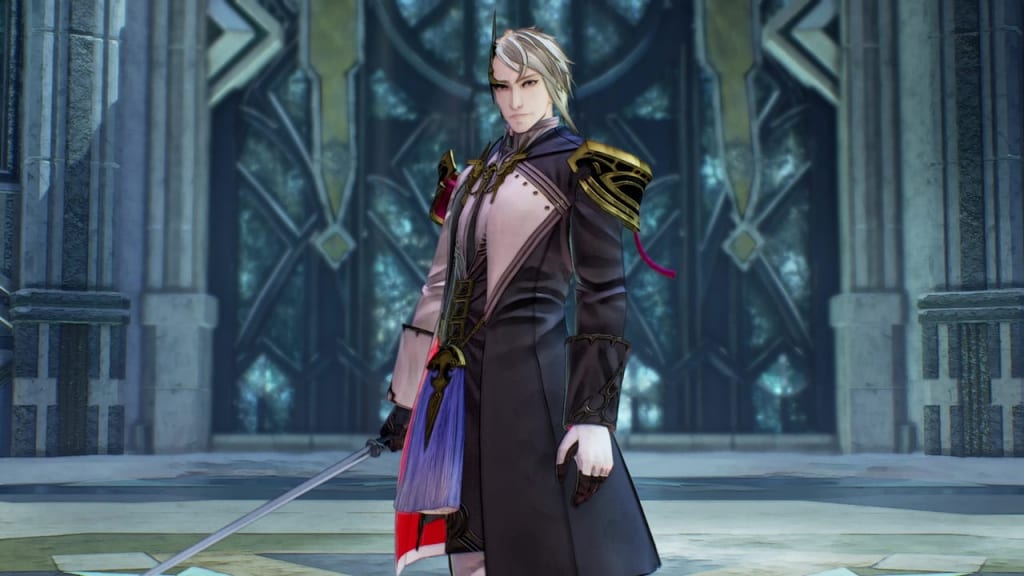 Boss battles are supposed to be fun, while also testing you on what you've learned so far. In Arise, however, these battles are tedious and frustrating experiences.
Boss battles are supposed to be fun, while also testing you on what you've learned so far. In Arise, however, these battles are tedious and frustrating experiences.
The decision to make bosses resistant to staggering throws all of the time you've spent optimizing your strategies and Arte selection for maximum combo potential out the window. And as one would expect, tickling the enemy for 5 seconds and then running away is not fun. Battles grind to a halt and take a drastic turn for the worse as you're forced to peck at enemies to slowly whittle away their health.
Sure, the combo counter will probably get pretty high during boss battles, but it's only because one of your party members (who you cannot directly control in battle) managed to hit the enemy while you were running away. If you quickly return to attacking the enemy, your combo will be "continued". But this method of "combo'ing" feels unpredictable and random, rather than challenging or rewarding. In short, these kinds of battles suck the fun out of the entire experience.
At this point, you may be asking, "Why is this a big deal? Aren't boss battles a mere fraction of the game's oerall experience?". And if this were a normal JRPG, you'd be right: boss battles wouldn't dominate the experience.
But in Arise, something awful happens at the 25-hour mark: minibosses start becoming regular overworld enemies. And at this point, the combo system, which is what makes the game fun and rewarding, stops mattering. Instead, the mind-numbing strategy of hit-and-run becomes the norm. At this point in the game, I found myself wanting to avoid battles at all costs due to how boring and long they became.
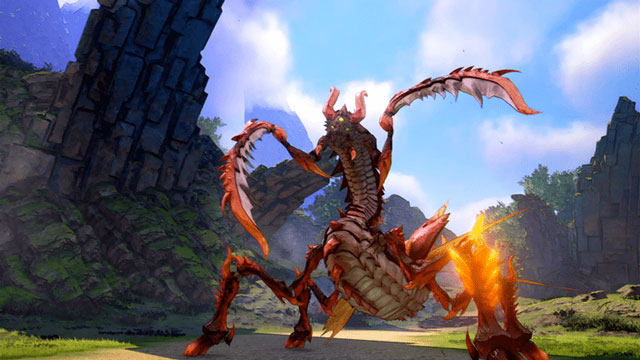 You'll probably fight this Mantis-lookin' thing about 20 times. Image Credit: Gosunoob
You'll probably fight this Mantis-lookin' thing about 20 times. Image Credit: Gosunoob
Worse still, after around 40 hours or so, the game's later zones contain almost nothing but minibosses. There is an exceptionally awful stretch at the end of the game where you'll have to trudge through long corridors with unavoidable minibosses around every corner. I have a hard time believing that the developers looked at the last 10 hours of this game and said to themselves with a straight face, "yep, the player is really gonna enjoy this". Suffice it to say, I did not enjoy it.
In summary, the game's fun and frantic battle system absolutely crumbles under the weight of these lengthy, monotonous miniboss/boss battles. It's quite a shame because, underneath the bloat and repetition, there is a great battle system in Arise's core. But the best battle system in the world can't redeem the utter tedium of this game's latter half, which is crawling with repetitive miniboss battles.
Major Issue #2: a Bloated, Repetitive Script
I think this next issue is best illustrated via an example. If you'd rather watch it, check out the vid below (Skip to 8:30. Watch it for 60 seconds; that's all you really need to understand my point):
But for those that would rather read text, consider a cutscene like the following:
- Alphen and Shionne, the male and female lead protagonists, just went through an intense experience, and Alphen is injured.
- After some time to cool off, the two open up to each other a bit.
- Shionne asks Alphen a pointed, emotional question
- Alphen momentarily turns his back to Shionne while telling her how much he cares about her.
- With his back turned, Shionne longingly reaches out to touch him.
- Right before Alphen turns around, Shionne quickly and reluctantly pulls her arm back towards herself with a despondent look on her face.
Truth be told, this is a great cutscene. It's able to convey how Shionne feels without actually saying anything, as you can clearly tell that she's desperate for human contact, and just wants to hold someone in a time of vulnerability and anxiety. But because of her condition (she hurts anyone she touches), as well as an emotional inability to let others in, she forces herself to remain stoic and detached.
In other words, this scene nails the Golden Rule of storytelling: Show, Don't Tell. It's much more satisfying to let viewers come to their own conclusions about characters, rather than being told through narration or exposition.
So, why bring this up? What's the problem with this game's script?
The problem is that, after this cutscene, you get bombarded with repetitive, clinical explanations as to how Shionne feels and what Shionne is thinking. You'll hear many different variations of "Shionne longs for human touch, but her thorns are keeping her away from others", and it grates a little more each time you hear it. All subtlety and nuance from the game's script is eventually discarded as you hear, for the 50th time, how Shionne feels.
It's also little insulting, as it suggests that you, the viewer, weren't smart enough to pick this up yourself from the cutscene. Instead, like a little schoolchild, the game beats you over the head with what it wants you to think and feel, over and over again.
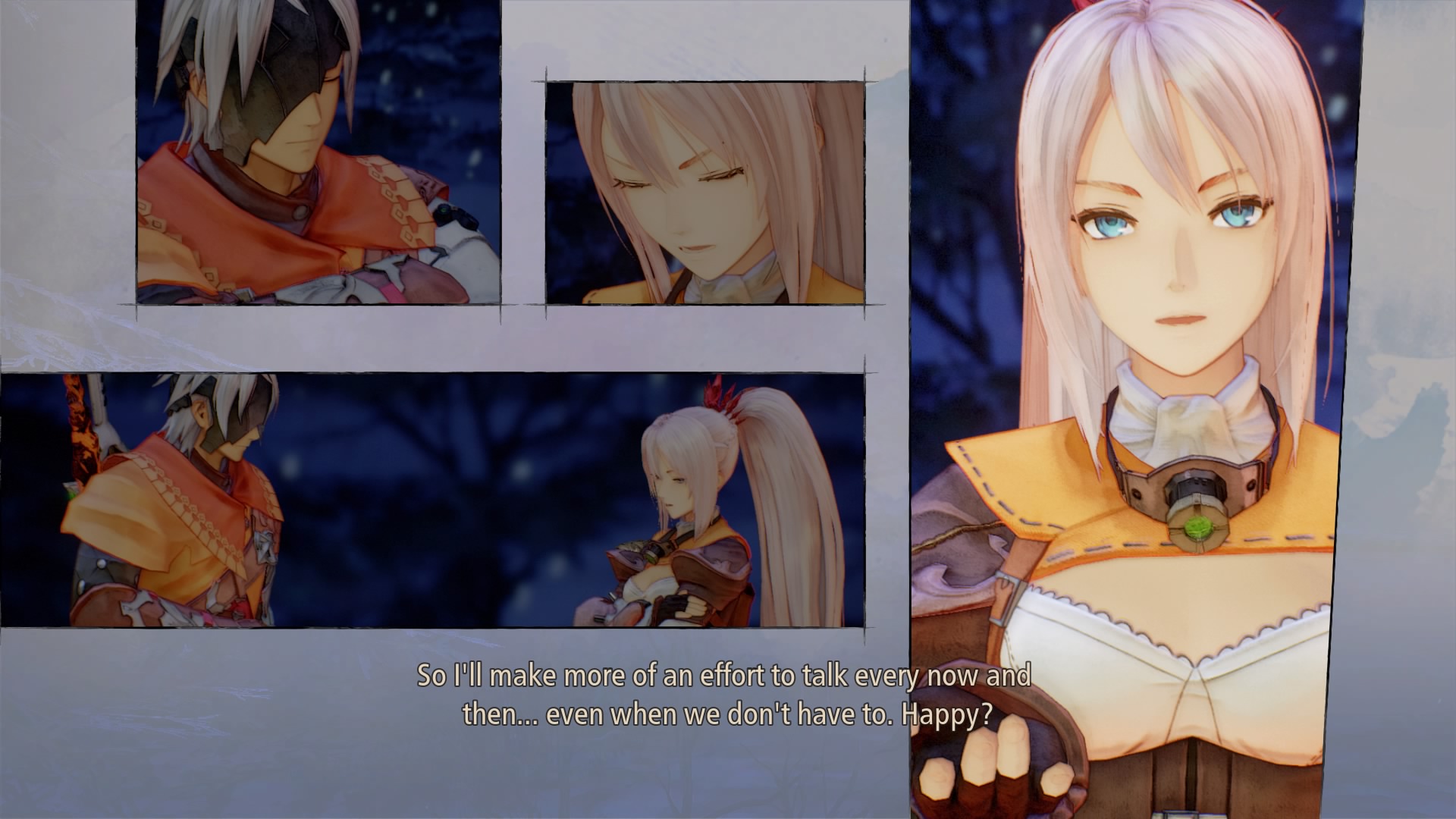 These optional scenes, called "Skits", are awkwardly animated and contain disposable, repetitive dialog. Skip them.
These optional scenes, called "Skits", are awkwardly animated and contain disposable, repetitive dialog. Skip them.
It's not just Shionne's feelings that get repeated, either: characters blather about many different topics, such as the difference between the game's two main civilizations (Dhana and Rena), the motivations of the game's heros and villains, what it means to be a slave and what it means to be free, etc, etc, etc.
These topics are interesting, but Arise's infantile, repetitive riffing on these topics will make most viewers' eyes glaze over as they hear, for the 20th time, what it means to be a free man amongst slaves.
In addition, the way that the characters talk about these concepts are lifeless and robotic. Prior Tales games had typically found great success with keeping the conversations between the main cast interesting and exciting. It was always entertaining to watch them bicker and banter with each other. But in Arise, aside from some interpersonal drama, characters don't argue about anything. They don't have different viewpoints. They don't even bother to debate, just for the fun of it.
Instead, characters in Arise converse in stilted, forced speeches, finishing each other's sentences with pre-baked responses. For any given cutscene, it's as if the script writers took one big monologue, cut it up into parts, and distributed each part to several different characters. Characters simply regurgitate the same talking points about each of the game's themes (slavery, love, etc). In general, aside from very few exceptions, there's a serious lack of chemistry or spontaneity between the main cast.
This is made much worse by the fact that there's so...much...dialog...in this game. If they had cut half of the dialog out of the game, Arise would lose 10 hours of runtime and be all the better for it. But alas, unless you have an appetite as big as Shionne's for pointless dialog, you'll be forced to endure all of it and hate every minute.
Major Issue #3: Extreme Pacing Issues
Given the points above (long, tedious boss battles and a bloated script), Arise never seems respectful of the fact that we all have a limited amount of time on this beautiful, broken planet of ours. Instead, Arise takes 20-30 hours of actual content and stretches it to its absolute limits in order to make it 50-60 hours.
Consider Arise's dungeons: Tales games typically have awful dungeons (I've mentioned that in the past), but given Arise's promise of being an evolution of the series, I was hopeful it would turn things around. Instead, its dungeons are perhaps the worst in the series. They consist of nothing but narrow corridors, elevators, and room keys. The general pattern is:
- Enter onto a new floor.
- Go all the way to the end, fighting hordes of respawning enemies.
- Discover that the path forward requires a magic key.
- Backtrack into all of the rooms (which have respawned enemies by this point) and find the key.
- Repeat this 1-3 times.
- Fight a boss, and the dungeon is over.
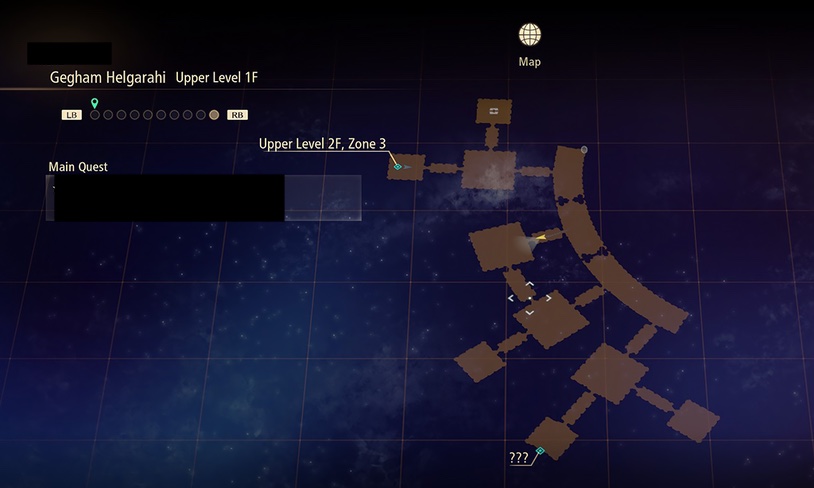 Every big square on this map contains multiple minibosses. There are about 10 floors in this dungeon. Excited yet?
Every big square on this map contains multiple minibosses. There are about 10 floors in this dungeon. Excited yet?
Especially egregious are the last two dungeons. For reasons unknown, the 2nd-to-last dungeon doesn't allow fast-traveling at all, which means that you have to walk all the way back through the way you came. Oh, and of course, the enemies have all respawned. The last dungeon also doesn't allow fast travel until you've reached the very end. So if you die midway through this multi-hour dungeon, you'll have to start all over again. Did I mention this dungeon is multiple hours long?
Or how about the game's boss-based sidequests? Each one features minibosses that you've mostly seen before, except they've been supercharged with higher damage output and much more health. It's no exaggeration to say that these types of sidequests take over 10 minutes to complete (assuming that you beat it on your first try).
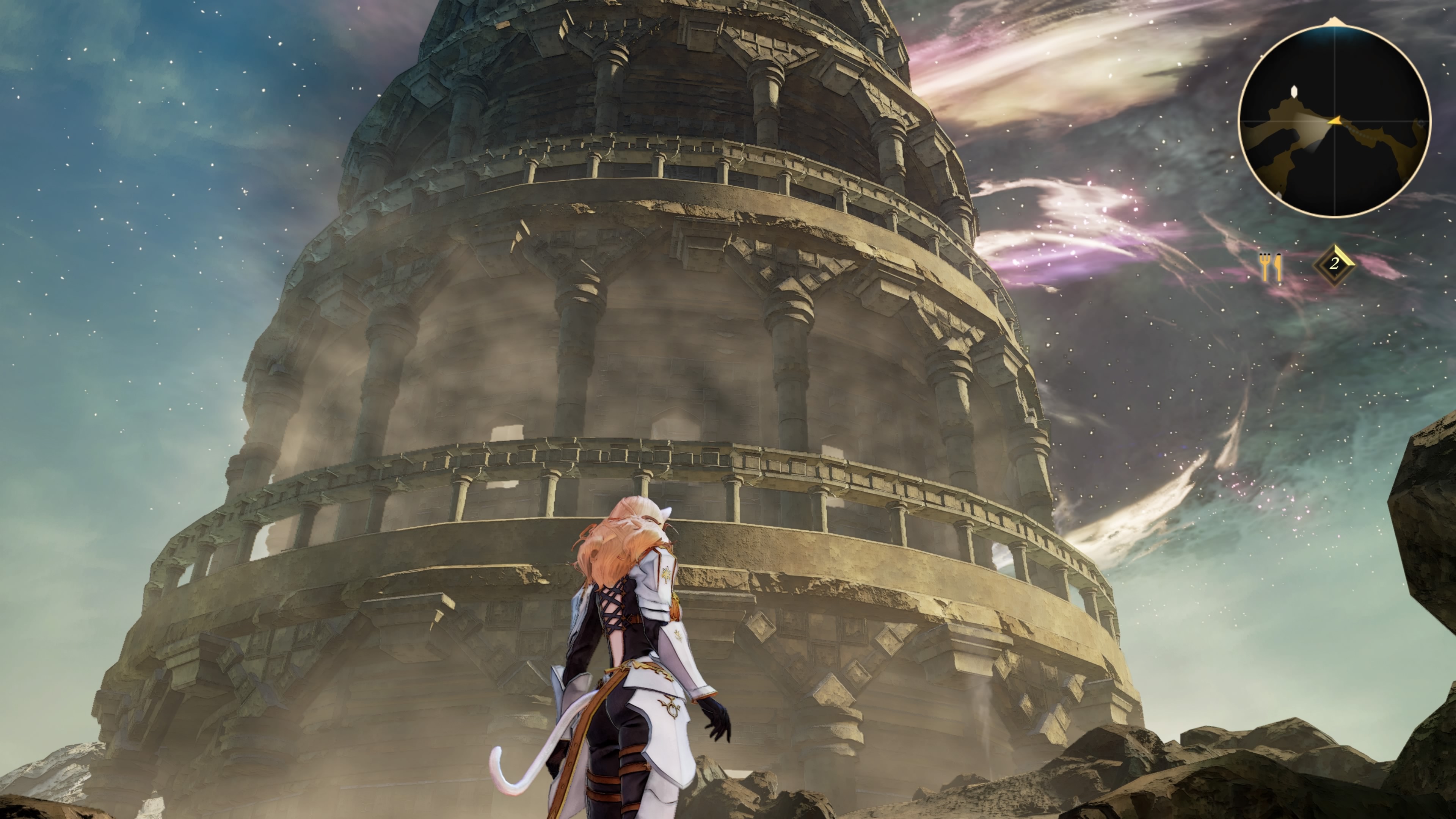 A tower which simply requires you to run up its spiraling staircase to get to the top. The characters even comment on how long and boring of a climb it is. Does it count as irony when the tower is, in fact, really boring to climb up?
A tower which simply requires you to run up its spiraling staircase to get to the top. The characters even comment on how long and boring of a climb it is. Does it count as irony when the tower is, in fact, really boring to climb up?
The game isn't even hard: it's simply a test of the player's patience and their will to continue in the face of monotony. Sure, you can crank the difficulty down a couple of notches and breeze through this game (something I was tempted to do), but that doesn't take away from the fact that this game is filled to the brim with repetition and filler.
Given its repetition and bloat, however, it was very frustrating to see Arise scramble to tie up all of its loose ends in the final act of the game. The game was perfectly content to take its sweet time with its grindy dungeons and inconsequential sidequests, but when the story takes a drastic turn, Arise hurriedly stumbles over itself to get things over with as quickly as possible. For example:
- the game's true major conflict is revealed via a minutes-long story exposition dump.
- a villain from many hours ago is revealed as the true final boss of the game, with no explanation as to how they survived or why they are so invested in thwarting our heros.
- The boss fight ends as quickly as it begins, with little in the way of uniqueness or intrigue.
And after you finish off the big bad guy for good, the game just...ends. Crumbs of a conclusion are scattered across the game's mid-credits montage, but nothing that I'd call "satisfying" or "rewarding".
This is especially awful because, by the end of the game, you'll come to the realization that there is no payoff for the long hours you've put into this game. None of the questions that Arise raised during its runtime were ever fully answered or addressed: will the freed Dhanan slaves actually function without a master? What will happen to Rena and the ancient civilization that inhabited it? Can Dhana and Rena peacefully coexist? Will Law and Rinwell kiss (a far more interesting couple than Alphen and Shionne)?
Instead, after beating the final boss, Arise seems content to throw a clichéd, fanservicey bone to the player and close it curtains for good.
In summary, to call the game's ending "rushed" is an understatement, as it fails to reflect the extreme unevenness of the game's pacing: brisk at the beginning, sluggish and self-indulgent in the middle, and peckish and reclusive by the game's conclusion.
Summary
For a game that strikes all the right notes in its opening hours, it's incredibly disappointing to see it stumble and sputter across the finish line. If I had to guess what went wrong, I'd assume that it's a combination of the following:
- Our dear friend COVID-19 making life a living hell for the game's designers and developers. According to Japanese culture experts, Japan was especially unprepared for the shift to work-from-home.
- The shift from a familiar (albeit dated) in-house engine to Unreal Engine 4. This likely introduced growing pains and inefficiencies in Arise's development.
- More than ever, games are really expensive to make. The Tales series is rather niche (at least in non-japanese countries), so I doubt that this game got the budget it needed.
- In the minds of many JRPG gamers, games are worthless unless they are 40+ hours long. It's a misguided judge of quality, but quite often, fans of the genre will not consider games that fall under this arbitrary length.
Perhaps the most redeeming quality of Arise is in its promise for future Tales Of games: Arise's aesthetic is superb, its voice actors are supremely talented, the battle system is great fun (until you get to the miniboss shift described above), and underneath the bloat, there's a compelling world with interesting characters. With these strong foundations, I can easily see Bandai Namco leveraging the great work that they've already done and improving upon Arise's failures to create an even-better successor.
To be clear, I'm a huge fan of the Tales series: there's nothing I want more than to see the series succeed on a worldwide scale. There's great potential in a sequel (spiritual or otherwise) to Arise, and I will be very eager to see what Bandai Namco does next with the series.
But on its own, Arise fails to live up to its "Triple A, Big Budget" premise. Here's hoping that Tales of Arise 2: the Arise-ening turns out a bit better than its predecessor.
Verdict: 2 Bloated Monologues Out of 5
Comment Policy: no flamewars or trolling. Just have fun and be nice!
